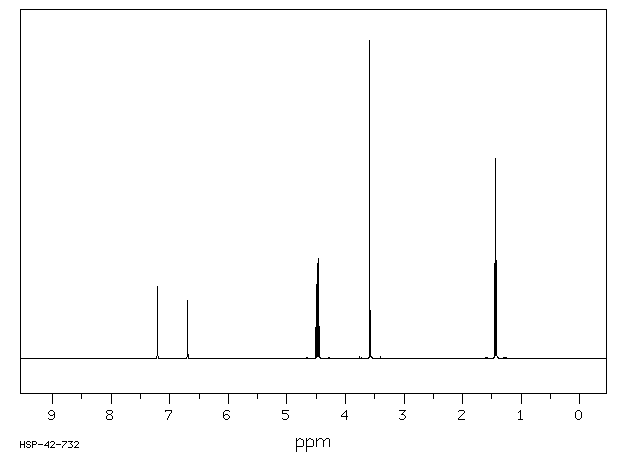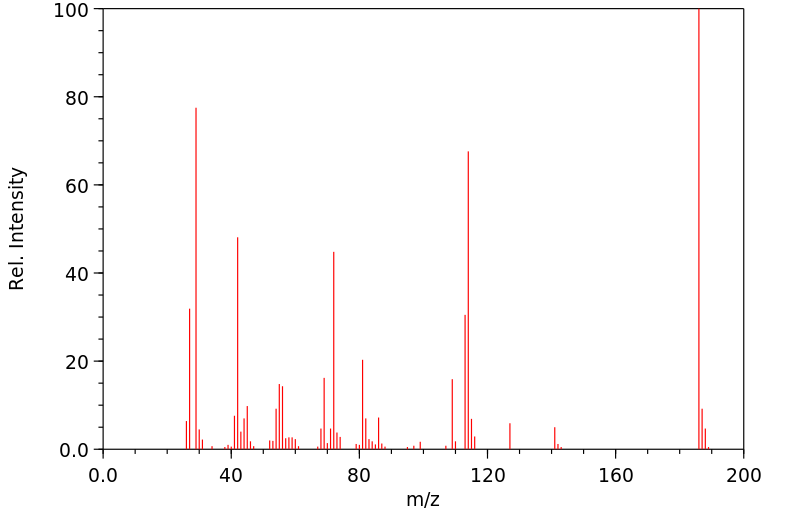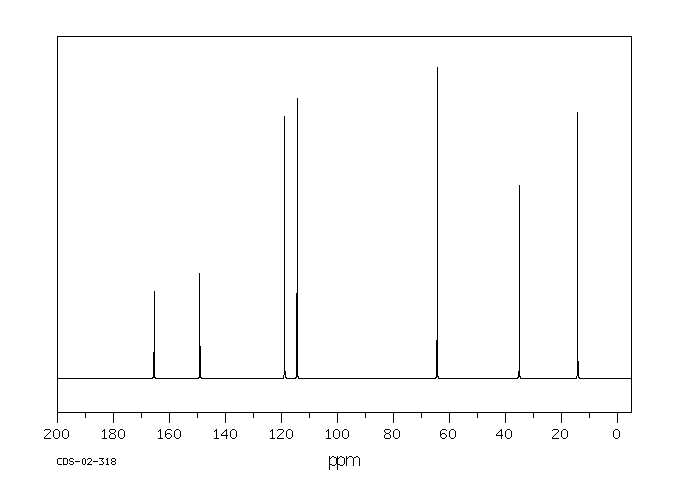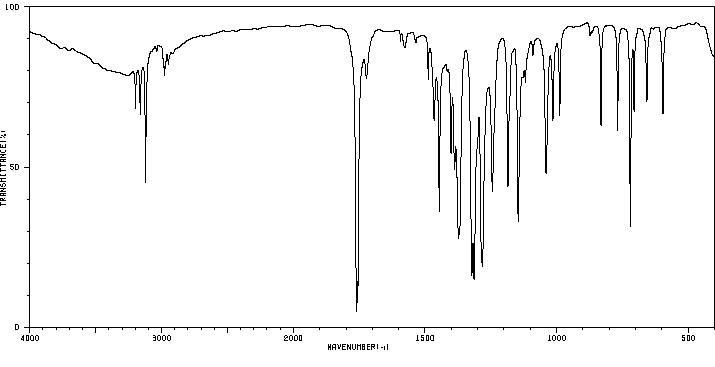卡比吗唑 | 22232-54-8
物质功能分类
-
物化性质
-
计算性质
-
ADMET
-
安全信息
-
SDS
-
制备方法与用途
-
上下游信息
-
文献信息
-
表征谱图
-
同类化合物
-
相关功能分类
-
相关结构分类
物化性质
-
熔点:124°C
-
沸点:240.4±23.0 °C(Predicted)
-
密度:1.2900 (rough estimate)
-
溶解度:DMSO:可溶5mg/mL,澄清(加热)
-
物理描述:Solid
-
碰撞截面:134.4 Ų [M+H]+ [CCS Type: TW, Method: calibrated with polyalanine and drug standards]
-
保留指数:1664;1678
-
稳定性/保质期:
如果按照规格使用和储存,则不会分解。避免接触氧化物及光线。
计算性质
-
辛醇/水分配系数(LogP):0.7
-
重原子数:12
-
可旋转键数:2
-
环数:1.0
-
sp3杂化的碳原子比例:0.428
-
拓扑面积:64.9
-
氢给体数:0
-
氢受体数:3
ADMET
安全信息
-
安全说明:S22,S36/37/39
-
危险类别码:R22
-
WGK Germany:3
-
危险品运输编号:3335
-
RTECS号:NJ2441000
-
海关编码:2922499915
-
危险性防范说明:P280,P305+P351+P338
-
危险性描述:H302
-
储存条件:将贮藏器密封后,放入一个紧密封装的容器中,并存放在阴凉、干燥的地方。
SDS
模块 1. 化学品
1.1 产品标识符
: Carbimazole
产品名称
1.2 鉴别的其他方法
2,3-Dihydro-3-methyl-2-thioxo-1H-imidazole-1-carboxylic acid ethyl ester
1-ethoxycarbonyl-3-methyl-2-thio-4-imidazoline
ethyl 3-methyl-2-thioimidazoline-1-carboxylate
1-methyl-3-carbethoxy-2-thioglyoxalone
athyromazole
Carbethoxymethimazole
Carbimazol
1.3 有关的确定了的物质或混合物的用途和建议不适合的用途
仅用于研发。不作为药品、家庭或其它用途。
模块 2. 危险性概述
2.1 GHS-分类
急性毒性, 经口 (类别 5)
2.2 GHS 标记要素,包括预防性的陈述
象形图 无
警示词 警告
危险申明
H303 吞咽可能有害。
警告申明 无
2.3 其它危害物 - 无
模块 3. 成分/组成信息
3.1 物 质
: 2,3-Dihydro-3-methyl-2-thioxo-1H-imidazole-1-carboxylic acid ethyl ester
别名
1-ethoxycarbonyl-3-methyl-2-thio-4-imidazoline
ethyl 3-methyl-2-thioimidazoline-1-carboxylate
1-methyl-3-carbethoxy-2-thioglyoxalone
athyromazole
Carbethoxymethimazole
Carbimazol
: C7H10N2O2S
分子式
: 186.23 g/mol
分子量
组分 浓度或浓度范围
carbimazole
<=100%
化学文摘登记号(CAS 22232-54-8
No.) 244-854-4
EC-编号
模块 4. 急救措施
4.1 必要的急救措施描述
一般的建议
请教医生。 向到现场的医生出示此安全技术说明书。
吸入
如果吸入,请将患者移到新鲜空气处。 如呼吸停止,进行人工呼吸。 请教医生。
皮肤接触
用肥皂和大量的水冲洗。 请教医生。
眼睛接触
用水冲洗眼睛作为预防措施。
食入
切勿给失去知觉者通过口喂任何东西。 用水漱口。 请教医生。
4.2 主要症状和影响,急性和迟发效应
据我们所知,此化学,物理和毒性性质尚未经完整的研究。
4.3 及时的医疗处理和所需的特殊处理的说明和指示
无数据资料
模块 5. 消防措施
5.1 灭火介质
灭火方法及灭火剂
用水雾,抗乙醇泡沫,干粉或二氧化碳灭火。
5.2 源于此物质或混合物的特别的危害
无数据资料
5.3 给消防员的建议
如必要的话,戴自给式呼吸器去救火。
5.4 进一步信息
无数据资料
模块 6. 泄露应急处理
6.1 作业人员防护措施、防护装备和应急处置程序
使用个人防护用品。 避免粉尘生成。 避免吸入蒸气、烟雾或气体。 避免吸入粉尘。
6.2 环境保护措施
不要让产品进入下水道。
6.3 泄漏化学品的收容、清除方法及所使用的处置材料
收集和处置时不要产生粉尘。 扫掉和铲掉。 放入合适的封闭的容器中待处理。
6.4 参考其他部分
丢弃处理请参阅第13节。
模块 7. 操作处置与储存
7.1 安全操作的注意事项
避免形成粉尘和气溶胶。
在有粉尘生成的地方,提供合适的排风设备。
7.2 安全储存的条件,包括任何不兼容性
贮存在阴凉处。 使容器保持密闭,储存在干燥通风处。
建议的贮存温度: 2 - 8 °C
7.3 特定用途
无数据资料
模块 8. 接触控制和个体防护
8.1 容许浓度
最高容许浓度
没有已知的国家规定的暴露极限。
8.2 暴露控制
适当的技术控制
根据良好的工业卫生和安全规范进行操作。 休息前和工作结束时洗手。
个体防护设备
眼/面保护
请使用经官方标准如NIOSH (美国) 或 EN 166(欧盟) 检测与批准的设备防护眼部。
皮肤保护
戴手套取 手套在使用前必须受检查。
请使用合适的方法脱除手套(不要接触手套外部表面),避免任何皮肤部位接触此产品.
使用后请将被污染过的手套根据相关法律法规和有效的实验室规章程序谨慎处理. 请清洗并吹干双手
所选择的保护手套必须符合EU的89/686/EEC规定和从它衍生出来的EN 376标准。
身体保护
根据危险物质的类型,浓度和量,以及特定的工作场所选择身体保护措施。,
防护设备的类型必须根据特定工作场所中的危险物的浓度和数量来选择。
呼吸系统防护
不需要保护呼吸。如需防护粉尘损害,请使用N95型(US)或P1型(EN 143)防尘面具。
呼吸器使用经过测试并通过政府标准如NIOSH(US)或CEN(EU)的呼吸器和零件。
模块 9. 理化特性
9.1 基本的理化特性的信息
a) 外观与性状
形状: 固体
b) 气味
无数据资料
c) 气味阈值
无数据资料
d) pH值
无数据资料
e) 熔点/凝固点
无数据资料
f) 沸点、初沸点和沸程
无数据资料
g) 闪点
无数据资料
h) 蒸发速率
无数据资料
i) 易燃性(固体,气体)
无数据资料
j) 高的/低的燃烧性或爆炸性限度 无数据资料
k) 蒸气压
无数据资料
l) 蒸汽密度
无数据资料
m) 密度/相对密度
无数据资料
n) 水溶性
无数据资料
o) n-辛醇/水分配系数
辛醇--水的分配系数的对数值: 0.805
p) 自燃温度
无数据资料
q) 分解温度
无数据资料
r) 粘度
无数据资料
模块 10. 稳定性和反应活性
10.1 反应性
无数据资料
10.2 稳定性
无数据资料
10.3 危险反应
无数据资料
10.4 应避免的条件
无数据资料
10.5 不相容的物质
强氧化剂
10.6 危险的分解产物
其它分解产物 - 无数据资料
模块 11. 毒理学资料
11.1 毒理学影响的信息
急性毒性
无数据资料
皮肤刺激或腐蚀
无数据资料
眼睛刺激或腐蚀
无数据资料
呼吸道或皮肤过敏
无数据资料
生殖细胞致突变性
无数据资料
致癌性
IARC:
此产品中没有大于或等于 0。1%含量的组分被 IARC鉴别为可能的或肯定的人类致癌物。
生殖毒性
无数据资料
特异性靶器官系统毒性(一次接触)
无数据资料
特异性靶器官系统毒性(反复接触)
无数据资料
吸入危险
无数据资料
潜在的健康影响
吸入 吸入可能有害。 可能引起呼吸道刺激。
摄入 如服入是有害的。
皮肤 通过皮肤吸收可能有害。 可能引起皮肤刺激。
眼睛 可能引起眼睛刺激。
接触后的征兆和症状
据我们所知,此化学,物理和毒性性质尚未经完整的研究。
附加说明
化学物质毒性作用登记: 无数据资料
模块 12. 生态学资料
12.1 生态毒性
无数据资料
12.2 持久性和降解性
无数据资料
12.3 潜在的生物累积性
无数据资料
12.4 土壤中的迁移性
无数据资料
12.5 PBT 和 vPvB的结果评价
无数据资料
12.6 其它不良影响
无数据资料
模块 13. 废弃处置
13.1 废物处理方法
产品
将剩余的和不可回收的溶液交给有许可证的公司处理。
与易燃溶剂相溶或者相混合,在备有燃烧后处理和洗刷作用的化学焚化炉中燃烧
受污染的容器和包装
按未用产品处置。
模块 14. 运输信息
14.1 联合国危险货物编号
欧洲陆运危规: - 国际海运危规: - 国际空运危规: -
14.2 联合国运输名称
欧洲陆运危规: 非危险货物
国际海运危规: 非危险货物
国际空运危规: 非危险货物
14.3 运输危险类别
欧洲陆运危规: - 国际海运危规: - 国际空运危规: -
14.4 包裹组
欧洲陆运危规: - 国际海运危规: - 国际空运危规: -
14.5 环境危险
欧洲陆运危规: 否 国际海运危规 国际空运危规: 否
海洋污染物(是/否): 否
14.6 对使用者的特别提醒
无数据资料
模块 15 - 法规信息
N/A
模块16 - 其他信息
N/A
制备方法与用途
卡比吗唑适用于各种类型的甲状腺功能亢进症,尤其适用于: ①病情较轻,甲状腺轻至中度肿大的患者。 ②青少年及儿童、老年患者。 ③甲状腺手术后复发,且不适宜使用放射性131I治疗者。 ④术前准备。 ⑤作为131I放疗的辅助治疗。
制备通过注射器将0.19 mL(2.43 mmol)1-甲基咪唑加入冷却至0℃的新鲜蒸馏干燥THF(30 mL)中,然后滴加氯甲酸乙酯(0.23 mL,2.43 mmol)。搅拌混合物3小时后,在0℃下将三乙胺(0.34 mL,2.43 mmol)加入溶液,使其达到室温。在25℃下继续搅拌3小时后,加入元素硫(0.08 g,2.60 mmol),并搅拌24小时。随后通过硅藻土垫过滤,并减压蒸发溶剂,得到灰色固体。该化合物用氯仿萃取,再通过硅藻土过滤从滤液中获得所需产物卡比吗唑,为白色固体。将其进一步纯化,使用乙酸乙酯/石油醚(1:1.5)作为洗脱剂,最终得到卡比吗唑。产率为0.44 g(97%)。
化学性质卡比吗唑是一种白色或类白色的结晶性粉末,熔点为122-125℃。在20℃时,它可溶于500份水、50份乙醇、330份醚、3份氯仿和17份丙酮。该化合物具有特异的气味,并且味道苦涩。
用途卡比吗唑是一种抗甲状腺药物,属于巯基咪唑类药物,与他巴唑同属一类。卡比吗唑是前体药,在体内转化为他巴唑,作用和不良反应相似。尽管作用较缓慢,但维持时间长于他巴唑。主要用于治疗甲状腺功能亢进。
此外,该化合物对稻飞虱、黑尾叶蝉及稻蝽象具有速效触杀作用;作为一种低毒杀虫剂,还表现出强烈的触杀效果,并有一定的胃毒和熏蒸作用以及杀卵效果。虽然杀虫效果迅速,但残留时间较短,通常仅能维持4-5天。
生产方法卡比吗唑的生产过程包括三个主要步骤:胺化、环合及缩合。
反应信息
-
作为反应物:描述:参考文献:名称:476. 2-巯基乙二醛N-酰化的机理摘要:DOI:10.1039/jr9580002387
-
作为产物:参考文献:名称:Antithyroid Drug Carbimazole and Its Analogues: Synthesis and Inhibition of Peroxidase-Catalyzed Iodination of
l -Tyrosine摘要:Synthesis and biological activity of the antithyroid drug carbimazole (CBZ) and its analogues are described. The introduction of an ethoxycarbonyl group in methimazole and its selenium analogue not only prevents the oxidation to the corresponding disulfide and diselenide but also reduces the zwitterionic character. A structure-activity correlation in a series of CBZ analogues suggests that the presence of a methyl substituent in CBZ and related compounds is important for their antithyroid activity.DOI:10.1021/jm800894m
文献信息
-
ANTHELMINTIC COMPOUNDS AND COMPOSITIONS AND METHOD OF USING THEREOF申请人:Meng Charles Q.公开号:US20140142114A1公开(公告)日:2014-05-22The present invention relates to novel anthelmintic compounds of formula (I) below: wherein Y and Z are independently a bicyclic carbocyclic or a bicyclic heterocyclic group, or one of Y or Z is a bicyclic carbocyclic or a bicyclic heterocyclic group and the other of Y or Z is alkyl, alkenyl, alkynyl, cycloalkyl, phenyl, heterocyclyl or heteroaryl, and variables X 1 , X 2 , X 3 , X 4 , X 5 , X 6 , X 7 and X 8 are as defined herein. The invention also provides for veterinary compositions comprising the anthelmintic compounds of the invention, and their uses for the treatment and prevention of parasitic infections in animals.本发明涉及以下式(I)的新型驱虫化合物: 其中 Y和Z分别是双环碳环或双环杂环基团,或者Y或Z中的一个是双环碳环或双环杂环基团,另一个是烷基,烯基,炔基,环烷基,苯基,杂环基或杂芳基,以及变量X 1 ,X 2 ,X 3 ,X 4 ,X 5 ,X 6 ,X 7 和X 8 如本文所定义。本发明还提供了包含本发明的驱虫化合物的兽药组合物,以及它们用于治疗和预防动物寄生虫感染的用途。
-
[EN] ANTHELMINTIC DEPSIPEPTIDE COMPOUNDS<br/>[FR] COMPOSÉS DEPSIPEPTIDIQUES ANTHELMINTHIQUES申请人:MERIAL INC公开号:WO2018093920A1公开(公告)日:2018-05-24The present invention provides cyclic depsipeptide compounds of formula (I) wherein the stereochemical configuration of at least one carbon atom bearing the groups Cy1, Cy2, R1, R2, R3, R4, Ra and Rb is inverted compared with the naturally occurring cyclic depsipeptide PF1022A. The invention also provides compositions comprising the compounds that are effective against parasites that harm animals. The compounds and compositions may be used for combating parasites in or on mammals and birds. The invention also provides for an improved method for eradicating, controlling and preventing parasite infestation in birds and mammals.
-
[EN] BINDING-SITE MODIFIED LECTINS AND USES THEREOF<br/>[FR] LECTINES DE SITE DE LIAISON MODIFIÉES ET USAGE CORRESPONDANT申请人:SMARTCELLS INC公开号:WO2010088261A1公开(公告)日:2010-08-05In one aspect, the disclosure provides cross-linked materials that include multivalent lectins with at least two binding sites for glucose, wherein the lectins include at least one covalently linked affinity ligand which is capable of competing with glucose for binding with at least one of said binding sites; and conjugates that include two or more separate affinity ligands bound to a conjugate framework, wherein the two or more affinity ligands compete with glucose for binding with the lectins at said binding sites and wherein conjugates are cross-linked within the material as a result of non-covalent interactions between lectins and affinity ligands on different conjugates. These materials are designed to release amounts of conjugate in response to desired concentrations of glucose. Depending on the end application, in various embodiments, the conjugates may also include a drug and/or a detectable label.
-
[EN] ANTI PARASITIC DIHYDROAZOLE COMPOUNDS AND COMPOSITIONS COMPRISING SAME<br/>[FR] DIHYDROAZOLES ANTIPARASITAIRES ET COMPOSITIONS LES INCLUANT申请人:MERIAL LTD公开号:WO2011075591A1公开(公告)日:2011-06-23The present invention relates to novel dihydroazole of formula (I) and salts thereof: Wherein R1, A1, A2, G, X and Y are as defined in the description, compositions thereof, processes for their preparation and their uses to prevent or treat parasitic infections or infestations in animals and as pesticides.
-
[EN] BETA-SUBSTITUTED BETA-AMINO ACIDS AND ANALOGS AS CHEMOTHERAPEUTIC AGENTS AND USES THEREOF<br/>[FR] ACIDES BÊTA-AMINÉS SUBSTITUÉS EN BÊTA ET ANALOGUES À UTILISER EN TANT QU'AGENTS DE CHIMIOTHÉRAPIE ET LEURS UTILISATIONS申请人:QUADRIGA BIOSCIENCES INC公开号:WO2017024009A1公开(公告)日:2017-02-09β-Substituted β-amino acids, β-substituted β-amino acid derivatives, and β-substituted β-amino acid analogs and (bio)isosteres and their use as chemotherapeutic agents are disclosed. The β-substituted β-amino acid derivatives and β-substituted β-amino acid analogs and (bio)isosteres are selective LAT1/4F2hc substrates and exhibit rapid uptake and retention in tumors expressing the LAT1/4F2hc transporter. Methods of synthesizing the β-substituted β-amino acid derivatives and β-substituted β-amino acid analogs and methods of using the compounds for treating cancer are also disclosed. The β-substituted β-amino acid derivatives and β-substituted β-amino acid analogs exhibit selective uptake in tumor cells expressing the LAT1/4F2hc transporter and accumulate in cancerous cells when administered to a subject in vivo. The β-substituted β-amino acid derivatives and β-substituted β-amino acid analogs and (bio)isosteres exhibit cytotoxicity toward several tumor types.β-取代β-氨基酸,β-取代β-氨基酸衍生物,β-取代β-氨基酸类似物和(生物)同位素以及它们作为化疗药物的用途被披露。β-取代β-氨基酸衍生物和β-取代β-氨基酸类似物和(生物)同位素是选择性LAT1/4F2hc底物,并在表达LAT1/4F2hc转运蛋白的肿瘤中表现出快速摄取和保留。还披露了合成β-取代β-氨基酸衍生物和β-取代β-氨基酸类似物的方法以及使用这些化合物治疗癌症的方法。β-取代β-氨基酸衍生物和β-取代β-氨基酸类似物在表达LAT1/4F2hc转运蛋白的肿瘤细胞中表现出选择性摄取,并在体内给予受试者后在癌细胞中积累。β-取代β-氨基酸衍生物和β-取代β-氨基酸类似物和(生物)同位素对几种肿瘤类型表现出细胞毒性。
表征谱图
-
氢谱1HNMR
-
质谱MS
-
碳谱13CNMR
-
红外IR
-
拉曼Raman
-
峰位数据
-
峰位匹配
-
表征信息











